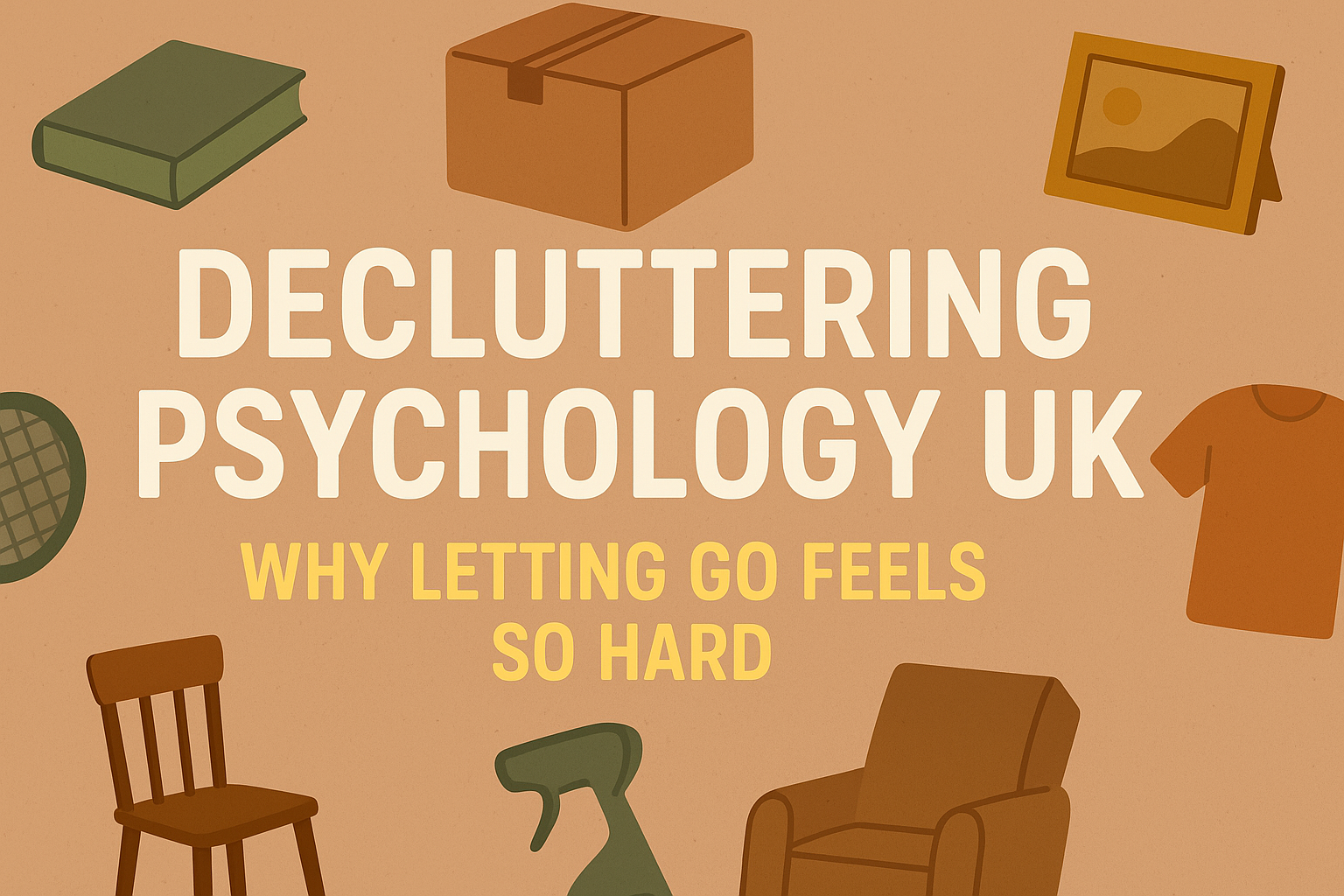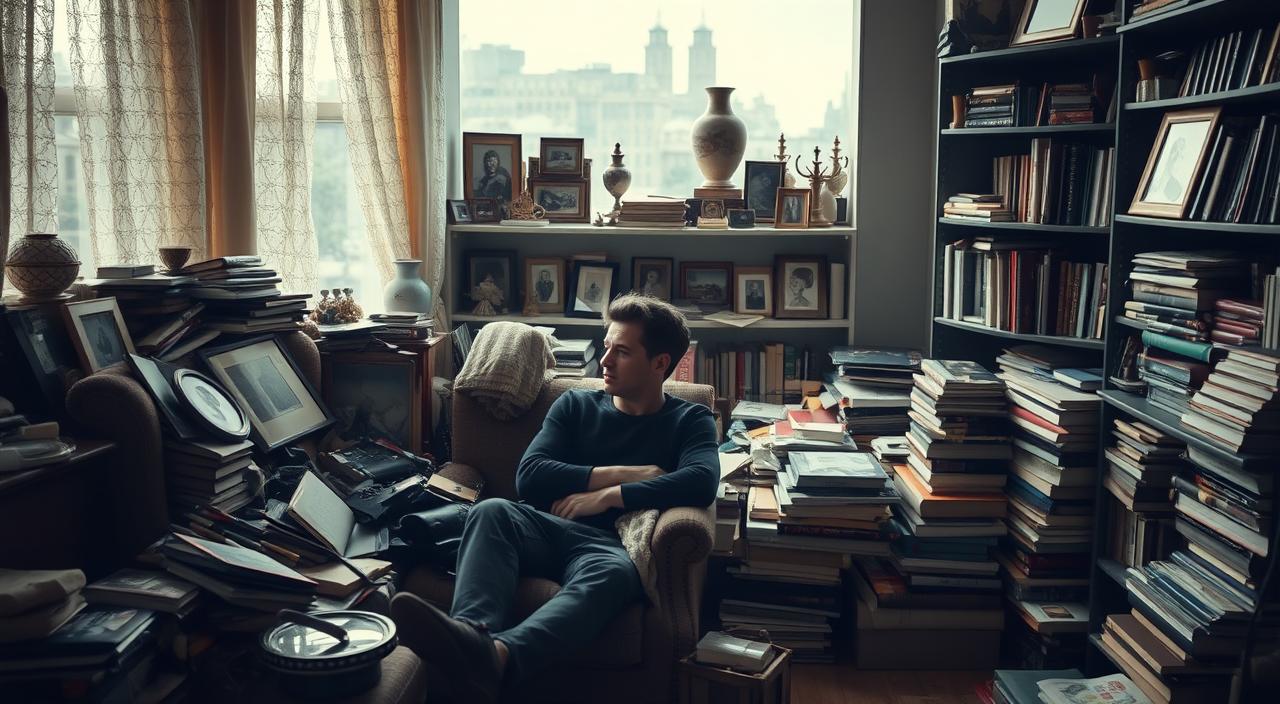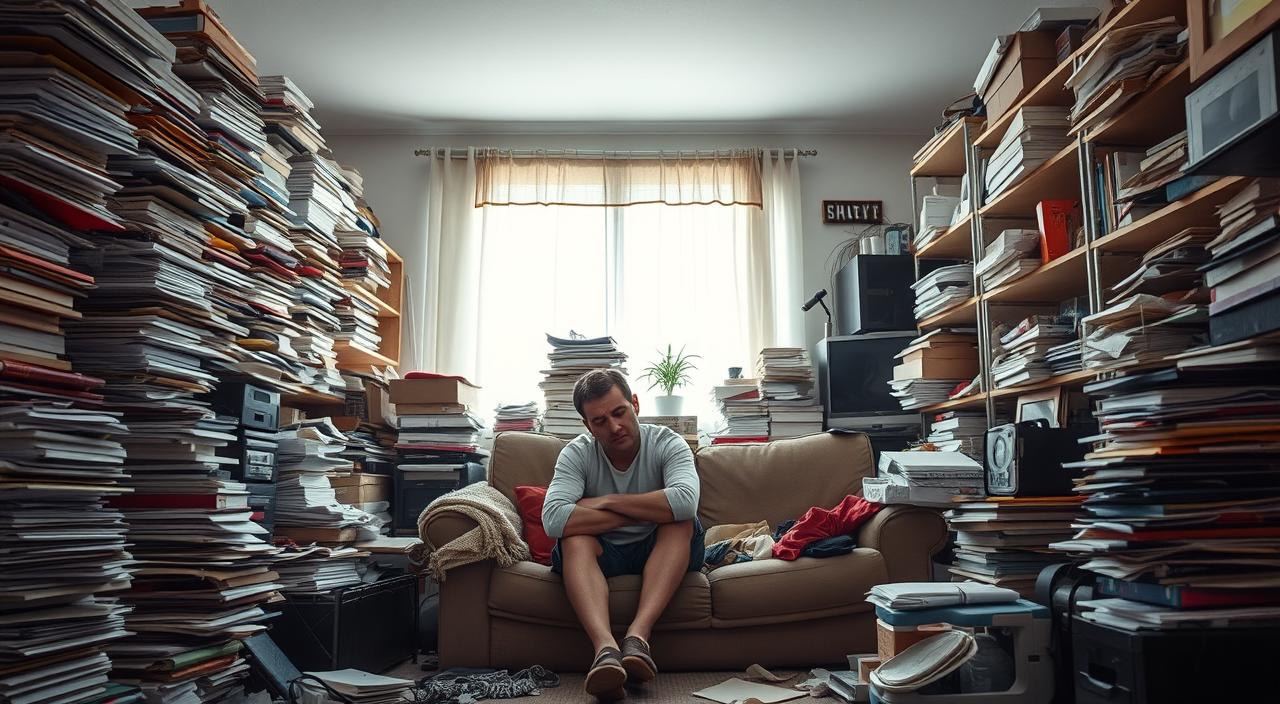
Understanding decluttering psychology UK research helps explain why so many people struggle to let go of their belongings. Across the country, households face growing amounts of clutter that quietly shape daily routines, mental wellbeing, and overall comfort. This build-up isn’t just about having too many possessions—it reveals deep emotional connections to the items we keep, even when they no longer serve a purpose.

Many feel overwhelmed by overcrowded rooms, messy storage spaces, or piles of things they “might need one day.” These patterns often reflect internal habits and emotional triggers rather than simple disorganisation. By exploring the psychological reasons behind accumulation and avoidance, we gain clarity on how to create calmer, healthier home environments.
Key Takeaways
- Emotional attachment is one of the main reasons people keep unnecessary items.
- Studies in the UK show clutter is strongly linked to stress and lower life satisfaction.
- Overcrowded spaces create cognitive overload, making daily decision-making harder.
- Understanding the psychology behind hoarding tendencies helps break the cycle.
- Practical, step-by-step methods make decluttering easier and more sustainable.
- Small mindset shifts often lead to long-term changes in home organisation.
The Emotional Side of Clutter
Our belongings are more than objects—they represent experiences, hopes, fears, and memories. Each item carries meaning, even when we are not consciously aware of it. This emotional layering explains why clearing out a drawer can feel unexpectedly difficult.
Fumio Sasaki and other minimalism advocates highlight the importance of listening to what items “tell” us about our internal world. This perspective aligns strongly with modern decluttering psychology UK findings.
The Pull of Nostalgia and Memory
Many people keep items because they serve as reminders of past relationships, milestones, or joyful moments. A holiday souvenir, a handwritten note, or a childhood gift can feel too emotionally valuable to discard.
Nostalgia is comforting—it gives us a sense of continuity and belonging. The fear is that letting go of the object means letting go of the memory itself.
Emotional Baggage and Unresolved Feelings
Not all possessions evoke positive emotions. Some carry memories of difficult experiences. Without realising it, individuals may hold on to painful reminders because throwing them away feels too final.
Therapists often observe that removing emotionally charged items can create space for healing. It becomes a symbolic release of past burdens and a step toward regaining control.
Taking time to reflect while sorting through belongings helps people understand what each item represents. This mindful approach reduces anxiety and builds confidence in decision-making.
Decluttering Psychology UK: Research and Scientific Evidence
Recent academic studies shed light on how clutter affects behaviour, mood, and cognitive performance.

What Studies Reveal About Possession Attachment
A 2023 behavioural study found that households with excessive belongings experienced:
- Reduced life satisfaction
- Higher stress levels
- Greater difficulty concentrating
Participants also reported feeling “stuck” or unable to make decisions when facing clutter.
Another publication in the Personality and Social Psychology Bulletin discovered that people living in cluttered homes showed consistently higher cortisol levels, indicating prolonged stress.
A major psychological barrier highlighted in multiple studies is indecision. Starting the process feels overwhelming, causing many to delay it for months or years.
Psychological Triggers Connected to Hoarding Tendencies
Hoarding behaviour goes beyond ordinary clutter and may require professional support. Even so, milder versions of the same triggers appear in typical households across the UK.
Common psychological factors include:
- Fear of waste
- Anxiety about making the “wrong” decision
- Identity connected to material ownership
- Procrastination rooted in discomfort
- Emotional compensation (keeping items for a sense of safety or stability)
Recognising these triggers helps people make clearer choices about what truly belongs in their living space.
How Clutter Impacts Mental Wellbeing
Although clutter appears harmless, it has measurable psychological and physiological effects. Overcrowded spaces increase stress and drain mental energy.

Stress, Anxiety, and Cognitive Overload
Living in a cluttered environment forces the brain to process too much visual information at once. This cognitive overload:
- Makes it harder to focus
- Slows decision-making
- Increases background anxiety
- Triggers feelings of frustration
Studies show that messy environments can cause a low-level fight-or-flight response. This means people feel unsettled even if they are not consciously aware of it.
Table 1: How Different Environments Influence Stress Levels
| Environment Type | Stress Impact | Common Symptoms |
|---|---|---|
| Home | High | Restlessness, irritability, poor sleep |
| Workplace | Moderate | Difficulty focusing, fatigue |
| Digital Space | Moderate | Information overload, anxiety |
Over time, these effects contribute to burnout, decreased productivity, and reduced emotional resilience.
Physical and Lifestyle Effects of Clutter
Cluttered spaces often lead to:
- Misplaced items
- Wasted time searching for things
- Increased cleaning difficulty
- Tension between household members
These daily frustrations strain relationships and can affect overall quality of life.
Practical Strategies for Letting Go
Having the right strategy makes the decluttering process easier and more realistic. Rather than aiming for instant transformation, focus on steady, sustainable progress.
Start Small and Build Momentum
Choosing one tiny area—a single shelf, one drawer, or a bedside table—helps avoid overwhelm. Set a 10–15 minute timer, work only on that space, and stop when the timer ends.
This method builds confidence through visible, quick wins.
Another helpful habit is the “one-in, one-out” rule: for every new item you bring home, one old item should leave.
Make Decisions With Intention
As you sort through belongings, ask:
- “Does this item still serve my life today?”
- “Am I keeping it out of obligation or fear?”
- “Would I miss this if it disappeared?”
These questions create clarity and reduce emotional conflict.
Marie Kondo’s well-known approach—keeping only what “sparks joy”—can be adapted to suit practical UK households. Her book The Life-Changing Magic of Tidying Up remains a helpful resource for structured decision-making.
The British Psychological Society – Understanding Hoarding
Creating Organised Spaces: Home, Work, and Digital Life
Decluttering is only the first step—organisation sustains a calmer lifestyle. A well-designed environment reduces stress, saves time, and supports productivity.
Building a Calm, Functional Home Environment
Simple organisational systems make daily routines easier:
- Use labelled baskets or boxes
- Keep frequently used items accessible
- Allocate a “home” for keys, wallets, and essential documents
- Create a maintenance habit (5 minutes per day)
One person reported not misplacing keys for nine years after creating designated drop-zones. This highlights how small structural changes bring long-lasting benefits.
Digital Decluttering Matters Too
Research shows that people spend more than seven hours per day on digital devices. Email overload, messy desktops, and scattered files create the same cognitive stress as physical clutter.
Table 2: Simple Digital Decluttering Actions
| Task | Time Required | Benefit |
|---|---|---|
| Delete unused apps | 5 minutes | Faster device performance |
| Organise email folders | 10–15 minutes | Reduced inbox anxiety |
| Remove duplicate photos | 15 minutes | More storage, better focus |
| Set screen-free periods | Ongoing | Improved mental clarity |
Digital organisation helps reduce decision fatigue and improves concentration.
How Decluttering Benefits Families
Decluttering is easier when everyone participates. Children who learn organisational skills early show better self-regulation, confidence, and independence. Families that maintain order together create smoother routines and fewer conflicts.
A tidy environment encourages:
- Respect for shared spaces
- More time together
- Less pressure during busy weeks
- Better sleep quality for both children and adults
Conclusion
Understanding decluttering psychology UK research is the key to overcoming emotional obstacles around letting go. Clutter is not simply a collection of objects—it reflects deeper connections to memory, identity, and fear.
By taking small, intentional steps, anyone can create a calmer home. Each decision to remove or keep an item builds emotional clarity and a sense of control. Over time, these choices reshape your living environment, improve wellbeing, and open space for what truly matters.
Decluttering is not a one-time event. It is an ongoing mindset shift—a commitment to surrounding yourself with items that support your life today, not your past. With awareness, patience, and practical strategies, it becomes a deeply rewarding journey toward a balanced and more meaningful lifestyle.

 CALL NOW
CALL NOW